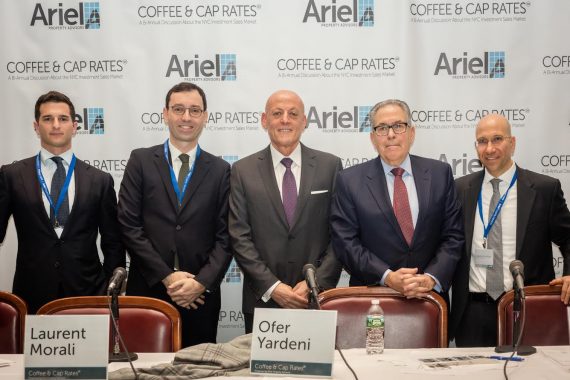Ofer Yardeni, who’s known mostly as a value-add multifamily investor and landlord, also considers himself something of an expert on development. Especially the arrested kind.
“If you are a 35-year-old and you live in [WeLive or Common], you are a loser,” the Stonehenge Partners CEO said to riotous laughter Wednesday morning during a panel discussion on the city’s multifamily market. “I’m sorry, but if you live with 10 people and you share breakfast or lunch… where do you go with your girlfriend?”
Yardeni was referring to shared-housing spaces such as WeWork’s WeLive platform and the startup Common, which he said provides a valuable service for young renters in their early to mid-20s, but is not a scalable business like traditional multifamily housing.
And just as he said two years ago that if Billionaires’ Row were a stock he would bet against it, Yardeni made the same proclamation about WeWork’s co-working business.
“If it was public would I short it? Absolutely. Not ‘if,’ but ‘when,’” he said.
Yardeni joined Kushner Companies president Laurent Morali and Maurice Kaufman of the investment firm AMAC Holdings on a panel moderated by Madison Realty Capital director Michael Stoler. The event, which focused on the city’s multifamily market, was hosted by Ariel Property Advisors.
Yardeni said he thinks it will take years for the market on the West Side of Manhattan – where developers like Related Companies, Brookfield Property Partners and the Moinian Group are building apartment towers with hundreds of units – to stabilize.

From left: Maurice Kaufman, Laurent Morali, Ofer Yardeni, Michael Stoler and Shimon Shkury
“This is an area that’s going to continue to give concessions year-after-year,” Yardeni said, adding that he thinks buildings in the Hudson Yards area will be at 85 percent occupancy for the next seven or eight years.
By contrast, Yardeni said buildings will sustain 98 percent occupancy on the Upper East Side, a neighborhood his firm has a number of multifamily holdings in.
Kaufman, whose firm AMAC picked up a portfolio of roughly two dozen buildings east of Second Avenue over the last two years, said the neighborhood will benefit significantly from the new subway. That is, once renters become more aware of it.
“Even now if you ask people what the stops are on the line, they really wouldn’t tell you correctly where they go,” he said. “And that was why had a big focus to buy up there.”
As for Kushner Companies, Morali said the company is gaining more traction as a construction lender as financing from traditional lenders has dried up. The firm recently announced plans to lend $200 million annually to developers over the next five years.
“Just in the past I would say nine months, we’re winning or getting very close to deals that we wouldn’t even be in the top on from a lending perspective because” traditional lenders have shied away, he said.
